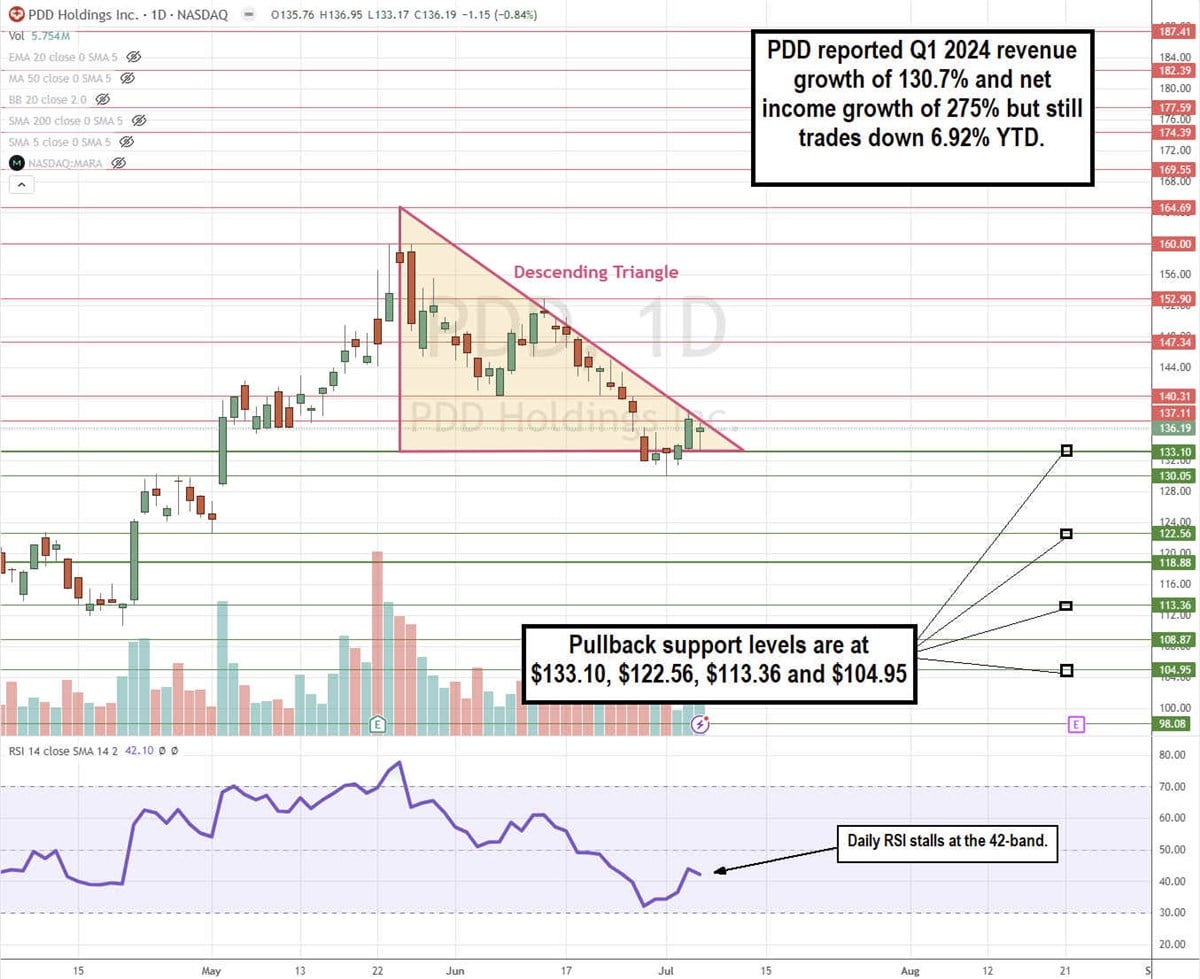
PDD Holdings Inc. (NASDAQ: PDD) is a Chinese e-commerce company that mainly operates two popular online businesses. The core business is the social commerce company Pinduoduo. Temu is their second business, an online store known for selling heavily discounted products sourced directly from manufacturers and factories in China. The combination of the two businesses has generated hypergrowth revenue streams that seem too good to be true at times.
However, the selloff in Chinese technology stocks has also hit PDD, causing its stock to trade down 6.92% year-to-date (YTD) compared to the 21.16% YTD performance of the Nasdaq-100. While their products appeal to budget-conscious shoppers, value-conscious investors may be interested in taking a look at this hypergrowth stock trading at just 11.94x forward earnings.
PDD Holdings is a multi-sector conglomerate that competes with other Chinese e-commerce companies and digital marketplaces, such as Alibaba Group Inc. (NYSE: BABA), JD.com, Inc. (NASDAQ: JD), and Amazon.com Inc. (NASDAQ: AMZN).
Pinduoduo Pioneers the Social Commerce Model
Social commerce is a new term coined in the age of social media. It leverages social media to help promote products while enabling users to purchase them directly through the social media platform and app. Pinduoduo took the concept one step further. Users find products they like on Pinduoduo and can get the price to decrease as they recruit family and friends to join in purchases.
The deeper discounting mechanism incentivizes social sharing while also building a sense of urgency to close deals before they disappear. Gamification is also embedded into the process with social games like pinwheels and daily check-in rewards, flash sales, gifting, and the ability to earn points. The convenience factor is embedded in the process as mobile is the primary access to the platform. The success of Pinduoduo in China led management to parlay its success outside of China with a new platform called Temu.
Temu is a Magnet For Growth
Temu exploded onto the scene and quickly became one of the most downloaded ecommerce apps in a matter of months by offering unbelievable discounts on products selling for literally pennies on the dollar. Social media influencers on TikTok and Alphabet Inc. (NASDAQ: GOOGL) owned YouTube helped spread the viral popularity of Temu.
Gamification is heavily integrated into the promotions, helping its popularity spread like wildfire. TEMU launched in July 2022 and has acquired a 17% market share of the U.S. online discount store market. The prices are so ridiculously cheap that users feel like they can "shop like a billionaire," as is their logo. The name Temu is short for "Team Up, Price Down," which was the pricing concept behind Pinduoduo. Temu has grown its customer base to over 167 million monthly active users (MAUs) globally.
Temu is also a Magnet for Controversy
With such meteoric growth, controversy is always bound to follow. One of the most common complaints with Temu is the poor quality of its goods. Just as quickly as it went viral on social media for the bargains, it also gained a reputation for cheaply constructed merchandise, with videos underscoring this point. Its rating at the Better Business Bureau is a C+, with many complaints about items not being delivered, falling apart, and having misleading descriptions. However, the company is diligent in responding to complaints, as every posted complaint receives a template response. Nonetheless, Temu continues to drive growth for PDD despite being unprofitable.

PDD is in a Descending Triangle Pattern
The daily candlestick chart for PDD illustrates a descending triangle pattern—the descending trendline formed at the $164.69 swing high. The descending upper trendline was formed from the lower highs on bounce attempts down to the flat-bottom lower trendline at $133.10. The breakdown was attempted on June 27, 2024, but shares bottomed at $130.05 and repelled back higher to the descending trendline. PDD continues closer to the apex point. The daily relative strength index (RSI) has stalled at the 42-band. Pullback support levels are at $133.10, $122.56, $113.36, and $104.95.
PDD Knocks it Out of the Park with Q1 2024 Results
PDD Holdings reported a 246% increase in Q1 2024 net income of $3.87 billion. Non-GAAP EPS was $2.86, crushing consensus estimates by $1.43. Revenues rose 131% YoY to $12.02 billion, crushing consensus estimates by $1.4 billion. Marketing services revenues rose 56% to $5.8 billion. Transaction services revenues jumped 327% to 6.14 billion. The company closed the quarter on March 31, 2024, with $33.5 billion in cash and cash equivalents.
PDD Holdings Co-CEO Lei Chen made some interesting comments during the conference call: “We are not a conventional company, and we hope to show you the true colors of our company no matter how bumpy or rough the numbers may seem to be. Our business does not follow a linear path, and our earnings will almost certainly fluctuate.”
As a disclaimer, Chen added, “Therefore, we suggest our shareholders not to measure our overall performance with results from a few quarters. Our financial performance may beat or miss market expectations at times. Still, as long as we keep focusing on long-term value creation, ultimately, this short-term fluctuation will converge to our growing intrinsic value.
Amazon.com Plans to Launch a New Direct From China Section
According to a report from The Information, Amazon may be planning to launch a new marketplace that sources deep discounted and unbranded items directly from Chinese manufacturers similar to Temu. The orders will ship to customers in 9 to 11 days. Products range from everyday items to apparel to home goods. Amazon hasn’t officially announced its plans.
PDD Holdings analyst ratings and price targets are at MarketBeat. Nine analysts endorse a buy rating, with an average price target of $188.33, implying a 38.29% upside.




